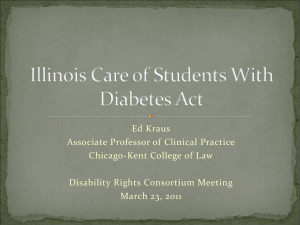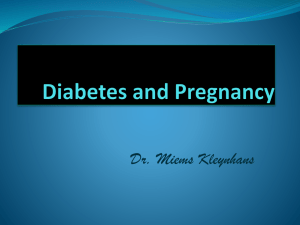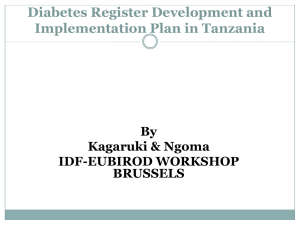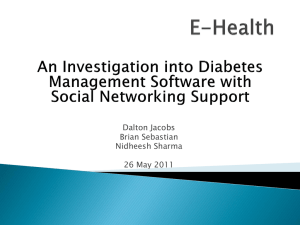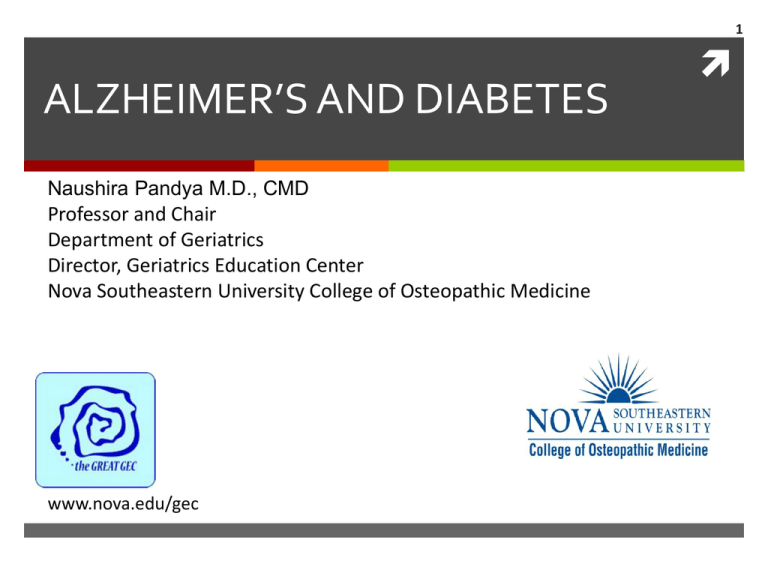
1
ALZHEIMER’S AND DIABETES
Naushira Pandya M.D., CMDM. NaushiPandyM.DM
Professor and Chair
Department of Geriatrics
Director, Geriatrics Education Center
Nova Southeastern University College of Osteopathic Medicine
www.nova.edu/gec
2
Disclosures
Dr. Pandya has received research funding and is a
speaker for Sanofi aventis.
3
Aging Drives Disease
Center for Disease Control database for deaths in 2010.
Alzheimer’s Disease Prevalence is
increasing especially in those age 85+
4
5
World Diabetes Prevalence in 2012
Diabetes Affects 8.3% of the US
population
6
7
Emerging complications of diabetes
Improvement in management of microvascular
complications (due to improved glycemic,
blood pressure control ) and macrovascular
complications (improved lipid control)
People with diabetes are living longer
Emergence of novel complications such as
cognitive impairment and dementia
Mediated by mechanisms not addressed by
conventional therapies
8
Diabetes and Dementia
Type 1 Diabetes: mild to moderate slowing of
mental speed and diminished mental flexibility
Type 2 Diabetes: cognitive changes affect learning,
memory, mental flexibility and mental speed
The rate of cognitive decline is accelerated in
elderly people with type 2 diabetes
T2 DM or impaired fasting glucose may be present
in 80% of people with Alzheimer’s disease (Janson et al,
Diabetes 2004;83)
9
Metanalysis of 16 studies assessing the
risk of dementia with diabetes
Incidence of any dementia was increased in people with
diabetes in 5 of 7 studies
Overall, the incidence of dementia was increased by 50-
100% relative to people without diabetes (CV factors not
controlled in all)
Increased risk of Alzheimer's disease 50-100% (7 of 11
studies)
Increase in risk of vascular dementia of 100-150% (6 of 7
studies)
Biessels et al. Lancet Neurology 5(1); Jan 2006
10
Accelerated Progression from Mild Cognitive Impairment to
Dementia in People with Diabetes
Weili Xu et al. Diabetes. 2010;59(11):2928-2935
11
Predictors of cognitive impairment and dementia
in older people with diabetes
Surviving participants of the Fremantle Diabetes Study (FDS), who
were aged 70 years
Of 302 participants, 28 (9.3%) had dementia (16 with probable
Alzheimer’s disease) and 60 (19.9%) had cognitive impairment
without dementia
The major independent longitudinal predictors of dementia were
older age (per decade; odds ratio 4.0)
diabetes duration (for each 5 years; odds ratio 1.69)
peripheral arterial disease (odds ratio 5.35)
exercise (which was protective; odds ratio 0.26)
For Alzheimer’s disease, diabetes duration was an independent
predictor in addition to age and diastolic blood pressure
Bruce et al. Diabetologia Feb 2008
12
Glycated haemoglobin and cognitive decline: the
Atherosclerosis Risk in Communities (ARIC) study
Christman et al. Diabetologia 2011; 54
• Mean 56 years.
• Women 56%, 21% black
• Mean HbA1c 8.5% in DM, and 5.5%
controls
• Diagnosed diabetes was associated with
cognitive decline on the DSST (OR 1.42,
p = 0.002),
• But HbA1c was not a significant
independent predictor of cognitive decline
when stratifying by diabetes diagnosis
(diabetes, p trend = 0.320; no diabetes, p
trend = 0.566).
13
Determinants of the risk of dementia
in individuals with diabetes.
Biessels et al. Lancet Neurology 5(1); Jan 2006
Mechanisms that may link diabetes
and dementia
Exalto et al. Exp Gerontol. 47 (11) Nov 2012
14
The potential role of insulin in the
pathogenesis of dementia
Biessels et al. Lancet Neurology 5(1); Jan 2006
15
16
Potential mediators of cognitive impairment in patients
with type 2 diabetes mellitus.
Nature Endo Rev 7; Feb 2011
17
The role of inflammation
Inflammation is now thought to be involved in
insulin resistance and the development of diabetes
Human studies point towards increased
inflammatory biomarkers (IL-6 and TNF) and agerelated cognitive impairment
One cross-sectional study in T2DM suggests
association between cognitive ability and Il-6
Potential mechanisms for obesity
induced inflammation
Shoelson et al. Gastroenterol 132(6) May 2007
18
19
T2DM is associated with the
development of vascular
dysfunction in the brain.
T2DM is a risk factor for
microvascular complications
as well as macrovascular
defects such as stroke
Chap 16; Mental and Behavioral
disorders; Diseases of the
Nervous System Feb 2013
20
Hypothalamic-pituitary-adrenal
dysregulation in diabetes
People with T2DM have activation of the
hypothalamic-pituitary-adrenal (HPA) axis
Raised levels of cortisol and
adrenocorticotrophic hormone (ACTH)
Increased cortisol levels are associated with
increased heart disease and diabetic
complications
Dysregulation of the HPA axis may be
associated with accelerated cognitive decline
and mood disturbances in patients with
T2DM
21
Glucocorticoids and cognitive decline
Chronic exposure of the hippocampus to high levels of
glucocorticoids (cortisol) thought to contribute to agerelated cognitive decline
Patients with Alzheimer’s have high cortisol levels and low
hippocampal volumes
Studies in T2DM suggest high cortisol levels are associated
with accelerated cognitive decline, reduced working
memory, processing speed, mental flexibility, immediate and
delayed memory (Edinburgh Type 2 Diabetes Study)
22
Morning cortisol levels and cognitive abilities in people
with Type 2 diabetes: the Edinburgh Type 2 diabetes study
Diabetes Care 33;714-720. 2010
23
Glucocorticoids and depression
Depression is a well-established risk factor for cognitive
impairment
Depression and its symptoms are more common in people with
diabetes mellitus
One study in participants both with and without T2DM, reported
high cortisol levels and more depressive symptoms were
associated with high blood glucose levels
This effect was stronger in African American participants (who have
a high incidence of both diabetes and depression) than in white
individuals
Boyle, S. H. et al. Diabetes Care 30, 2484-2488 (2007)
24
What can be done to reduce the
development of dementia in diabetes
Blood pressure control?
Better control of diabetes?
Avoidance of hypoglycemia
Statins?
Treat depression?
25
Does treatment of diabetes make a
difference?
Prospective study of type 2 diabetes and cognitive decline in
women aged 70-81 years (Logroscino et al. BMJ 2004, Mar 6)
Nurses' health study in the US; two cognitive interviews were carried
out by telephone during 1995-2003
Women with type 2 diabetes performed worse on all cognitive tests
than women without diabetes at baseline (odds ratios 1.34)
In contrast, women with diabetes who were on oral hypoglycaemic
agents performed similarly to women without diabetes (OR 1.06 and
0.99)
Women not using any medication had the greatest odds of poor
performance (OR 1.74 and 1.45)
Women with type 2 diabetes have about 30% greater odds of poor
cognitive function than those without diabetes, with a 50% increase
after 15 years' of diabetes
26
Effects of intensive glucose lowering on brain structure and
function in people with type 2 diabetes (ACCORD MIND)
Participants (aged 55–80 years) with T2DM, high HbA 1c
concentrations (>7·5%; >58 mmol/mol), and a high risk of
cardiovascular events
The Digit Symbol Substitution Test (DSST) score, at baseline and at 20
and 40 months and total brain volume (TBV) by MRI, as a primary
brain structure outcome
There was no significant treatment difference in mean 40-month
DSST score (difference in mean 0·32, 95%;p=0·2997)
The intensive-treatment group had a greater mean TBV than the
standard-treatment group (4·62, 2·0 to 7·3; p=0·0007)
Lancet Neurology, The, 2011-11-01, Volume 10, Issue 11
27
Approach to management
of hyperglycemia:
more
less
stringent
stringent
Figure 1
Patient attitude and
expected treatment efforts
highly motivated, adherent,
excellent self-care capacities
Risks potentially associated
with hypoglycemia, other
adverse events
low
Disease duration
newly diagnosed
Life expectancy
long
Important comorbidities
absent
few / mild
severe
Established vascular
complications
absent
few / mild
severe
Resources, support system
readily available
less motivated, non-adherent,
poor self-care capacities
high
long-standing
short
limited
Diabetes Care, Diabetologia. 19 April 2012 [Epub ahead of print]
(Adapted with permission from: Ismail-Beigi F, et al. Ann Intern Med 2011;154:554)
28
ADA-EASD Position Statement: Management of
Hyperglycemia in T2DM
•Age: Older adults
-
Reduced life expectancy
Higher CVD burden
Reduced GFR
At risk for adverse events from polypharmacy
More likely to be compromised from hypoglycemia
Less ambitious targets
HbA1c <7.5–8.0% if tighter targets
not easily achieved
Focus on drug safety
Diabetes Care,
Diabetologia. 19
April 2012
29
Cognitive impairment affects management of diabetes
and treatment-related complications
Less involvement on diabetes self-care and monitoring
Increased likelihood of severe hypoglycemia
Increased risk of major cardiovascular events and death
Increased risk of injurious falls
We need efficient screening tools and to establish
whether early detection can improve long-term
outcomes
30
Proportion of patients with clinical outcomes during follow-up
according to cognitive function status at baseline.
ADVANCE De Galan et al. Diabetologia Nov 2009 52(11)
31
Risk Factors For Severe Hypoglycemia
Age
Unawareness of, or previous
severe hypoglycemia
High doses of insulin or
sulfonylureas
Recent hospitalization or
intercurrent illness
Polypharmacy (>5 prescribed
meds)
“Tight control” of diabetes
Chelliah. Drugs aging 2004:21
Poor nutrition or fasting
Chronic liver, renal or
cardiovascular disease
Vigorous sustained exercise
Endocrine deficiency
(thyroid, adrenal, or
pituitary)
Alcohol use
Loss of normal counter-
regulation
32
Hypoglycemic Episodes and Risk of Dementia in Older Patients With Type 2
Diabetes Mellitus
JAMA. 2009;301(15):1565-1572. doi:10.1001/jama.2009.460
Date of download: 5/7/2013
Copyright © 2012 American Medical
Association. All rights reserved.
33
Screening
Persons with diabetes are screened for retinopathy,
neuropathy, microalbuminuria
Screening for peripheral arterial or cardiovascular
disease if symptomatic
Cognitive impairment or dementia is often
undiagnosed
Perceived lack of benefit of early diagnosis
How does this translate to persons with T2 DM?
34
Diagnosis
Work-up of any patient with T2DM and cognitive
dysfunction is the same as any other patient with
cognitive complaints
Behavior, mood and personality changes should be
addressed
Assess diabetes management and support system
Serum chemistry, thyroid, B12, HIV, RPR as indicated
Neuroimaging (MRI if possible)
35
Cognitive trajectories in T2DM
Modest decline in cognition over time even in people without
dementia
This affects verbal memory, information processing speed, attention
and executive function
Modest decrements affect all age groups and are slowly progressive
over time
These are NOT early manifestations of dementia
Dementia only affects a subset; possible added effect of Alzheimer’s
or severe cerebrovascular disease?
36
Bilateral medial temporal lobe atrophy (right hippocampus illustrated with arrows) in a
subject with Alzheimer’s disease demonstrated on coronal images acquired with: (A) 64
detector row computed tomography scanning; (B) 1.5 tesla MRI volumetric T1 weighted
sequence
Schott J M et al. BMJ 2011;343:bmj.d5568
©2011 by British Medical Journal Publishing Group
37
What about MRI?
Multiple white matter areas of ischemia
Functional MRI showing less brain
activation in diabetic subject
Gail Munsen PhD. Joslin Diabetes Center 2011
Diabetic subject
Control subject
38
39
Treatment
As yet there are no diabetes-specific therapies with proven
efficacy in preventing or ameliorating cognitive decline
Cognitive function is being included as an outcome measure
in more therapeutic trials
Glucose lowering does not show consistent benefit on
cognition
The large ACCORD-MIND study showed that intensive
glucose lowering treatment over 40 mth in people over 55
with T2DM did not benefit cognitive performance
40
www.nova.edu/gec
THANK YOU!



